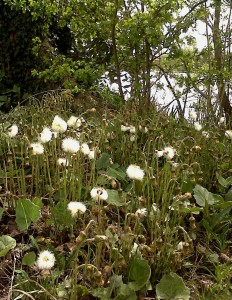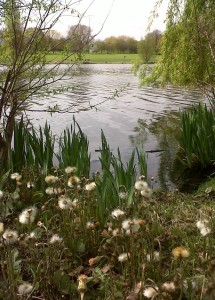According to a paper in the latest edition of ‘British Wildlife’ Colt’s-foot (Tussilago farfara) is flowering much later than it did 100 years ago. It is not yet understood why. The trend with other species is usually in the opposite direction. One theory is that it could be down to sampling bias caused by an unexplained decline in the abundance of this Dandelion relative, which is found in scattered localities in Bexley but is almost nowhere particularly numerous. In other words, those who record the times at which plants come into flower may simply be coming across it less often.
One place where it can be seen is around the margins of Danson Park lake, where it was running to seed yesterday (April 23rd). The biggest patch I have seen is on the bund by the industrial estate adjoining the southern section of what is now LWT’s reserve at Braeburn Park.

Colt’s-foot running to seed at Danson park, 23rd April 2015, with emerging leaves. (Photo: Chris Rose)
The common name comes from the shape of the leaves which appear after the flowers have come up. It can be confused with the superficially similar garden escape Heliotrope (Petasites species).

